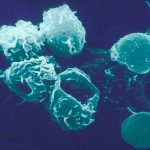Lien vers Pubmed [PMID] – 11754006
Eur. J. Immunol. 2002 Jan;32(1):77-86
Embryonic thymic lobes cultured in vitro in the presence of deoxyguanosine (dGuo) are accepted in fully mismatched recipients. The proposed explanation for this finding was the depletion of hematopoietic cells induced by the treatment associated with poor immunogenicity of thymic epithelium. We have recently demonstrated that embryonic tissues obtained at stages prior to hematopoietic colonization are nevertheless rejectable. Thymic epithelium from E10 embryos is not an exception in this respect and is acutely rejected in less than 12 days. Based on these findings we re-evaluated the protective role of dGuo against thymic allograft rejection. We observed that, in contrast to embryonic heart and intestine, allogeneic thymic epithelium naturally devoid of hematopoietic cells was accepted after treatment with dGuo. Active recognition of the allogeneic transplant was revealed by the presence of activated T cells, which infiltrated the accepted grafts, and showed reduced levels of IL-2 and IFN-gamma expression, although no essential role for IL-10 as regulatory cytokine has been found. Also, increased numbers of apoptotic cells are found in both dGuo-treated and untreated allogeneic control grafts. Moreover, the role of the indirect pathway of antigen recognition in allograft acceptance was excluded. The results show that allograft acceptance of dGuo-treated thymic lobes is induced by a direct, tissue-specific effect on the thymic stroma.


